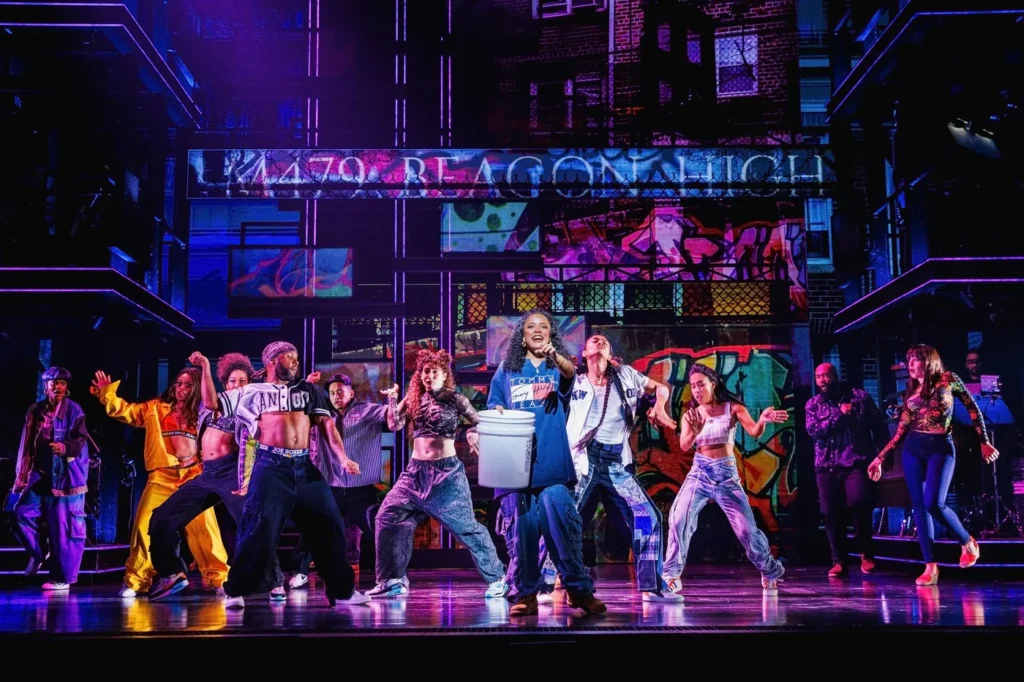Broadway has long been home to stories of aspiration, struggle, and self-discovery. When Alicia Keys—an artist known for her soulful voice and deeply emotional songwriting—takes the reins of a new musical, expectations are naturally high. “Hell’s Kitchen”, inspired by her own life, marks Keys’ debut on Broadway, bringing her unique sensibility as a musician into the world of theater. Premiering at the Shubert Theatre on April 20, 2024, following a successful Off-Broadway run at The Public Theater, this show is more than a mere tribute to New York City. It is a vibrant exploration of identity, family, dreams, and the inevitable conflict between youthful ambitions and parental fears.
The story follows Ali, a 17-year-old girl living with her mother in a cramped apartment near Times Square. As she navigates the challenges of adolescence in New York, Ali dreams of making a name for herself as a musician, much like Keys did. Her mother, however, haunted by her own past mistakes, worries about her daughter’s future and attempts to steer her away from the struggles she faced herself. This central conflict—the tension between generational dreams and the realities of a harsh world—makes *Hell’s Kitchen* a compelling and heartfelt narrative.
The Music: Alicia Keys’ Signature Sound
Alicia Keys is one of the most iconic voices in contemporary R&B, known for her ability to craft powerful ballads that resonate with themes of self-discovery, resilience, and love. Her musical contributions to *Hell’s Kitchen* blend seamlessly with the narrative, infusing the production with her signature soulful sound while still incorporating elements of Broadway’s grand theatrical style. The songs are packed with emotion, from uplifting anthems of self-realization to introspective ballads that explore complex family dynamics.
The soundtrack of *Hell’s Kitchen* feels like a greatest hits album, though the songs are original. They bear the hallmarks of Keys’ musical style—piano-driven melodies, raw emotion, and layered harmonies. Tracks like “Times Square Lights” and “Ali’s Anthem” stand out as show-stopping numbers that will be remembered long after the curtain falls. Alicia Keys’ lyrics, always honest and vulnerable, add depth to the characters’ experiences. Her use of intimate, soul-baring language elevates the audience’s connection to Ali’s struggles, making her journey both relatable and inspiring.
What’s particularly remarkable is how the music shifts to reflect Ali’s emotional journey. In the beginning, the songs are filled with the electric energy of youth and determination, with vibrant rhythms and celebratory melodies capturing the pulse of New York. As Ali begins to face challenges, the music takes a more introspective tone, with slower tempos and rich harmonies, allowing the audience to feel the weight of her experiences.
While some critics may argue that Alicia Keys’ pop-R&B sensibility could overshadow the more traditional elements of musical theater, “Hell’s Kitchen” strikes an effective balance. The show honors Broadway’s traditions while infusing it with a contemporary flair that feels fresh and modern. The use of a live band playing rich orchestrations, alongside Keys’ signature piano playing, allows the music to feel dynamic, never constrained by genre. It’s a testament to Keys’ versatility as a songwriter that she’s able to move fluidly between Broadway ballads and more radio-friendly pop anthems.
The Story: A Coming-of-Age Tale for a New Generation
At the heart of “Hell’s Kitchen” is Ali, a character that reflects Alicia Keys’ own experiences as a teenager growing up in New York City. The narrative captures the intensity of a young woman’s ambition, her battle to be seen and heard, and the complicated dynamics of a mother-daughter relationship. Ali is a character full of contradictions—bold yet vulnerable, optimistic yet burdened by self-doubt. She dreams of making it big, yet is acutely aware of the odds stacked against her, especially as a young woman of color in a fiercely competitive industry.
The show’s plot draws clear parallels to Alicia Keys’ personal story, but it doesn’t feel like a biographical re-telling. Instead, it uses her experiences as a framework to explore broader themes of identity, belonging, and the cost of chasing one’s dreams. Ali’s mother, a central figure in the narrative, adds layers of complexity to the story. She represents the weight of expectations and the generational trauma passed down from parent to child, afraid that Ali will repeat the mistakes of her past.
The relationship between Ali and her mother is at the core of the musical’s emotional resonance. It is a battle of wills between two women who love each other deeply but struggle to communicate their fears and dreams. The mother’s concern for Ali, born from her own hardships, creates a dynamic where protection and suppression are in constant tension. This maternal conflict provides a compelling lens through which to view the show, particularly as it explores how Ali navigates her independence while still seeking her mother’s approval.
Thematically, “Hell’s Kitchen” delves into the quintessential New York story—the pursuit of dreams in a city that can be both exhilarating and unforgiving. Ali’s journey is filled with moments of hope, frustration, and triumph, and her resilience mirrors that of countless young artists who have sought to make their mark on the world. Her story is one of self-discovery, but also one that critiques the idea of success as a linear path. The show makes clear that setbacks are inevitable, and that true strength comes from learning to move forward in spite of them.
Staging and Choreography: A Visually Dynamic Experience
One of the most notable aspects of “Hell’s Kitchen” is its staging. The design team has created a set that mirrors the vibrancy and chaos of New York City, with towering skyscrapers, neon lights, and the constant motion of the city’s streets. The set seamlessly transitions between Ali’s cramped apartment, Times Square’s bustling streets, and the intimate spaces where Ali practices her music. Each location is rendered in rich detail, allowing the audience to feel immersed in Ali’s world.
The choreography by Camille A. Brown, known for her dynamic and narrative-driven style, adds an additional layer of energy to the production. The movement on stage is fast-paced and expressive, capturing the frenetic energy of New York while also reflecting the internal emotions of the characters. In particular, Ali’s dance sequences feel like extensions of her character, with each movement expressing her frustrations, hopes, and triumphs.
The dance numbers are not simply decorative; they are woven into the fabric of the storytelling. In moments of heightened emotion, the choreography becomes a visual representation of the characters’ internal struggles. This is particularly evident in scenes where Ali’s ambition clashes with her mother’s fears. The tension between them is expressed not just in words, but in the physicality of their interactions.
Performances: A Stellar Cast Brings the Story to Life
The success of “Hell’s Kitchen” relies heavily on the performances of its cast, particularly the actress playing Ali. In the Broadway production, the role is inhabited by a newcomer whose raw talent and emotional depth make her a standout. She captures Ali’s youthful exuberance, but also conveys the vulnerability and uncertainty that come with chasing a seemingly impossible dream. Her vocal performance is outstanding, blending the technical precision required of Broadway with the soulfulness that defines Alicia Keys’ music.
Ali’s mother, portrayed by a veteran Broadway actress, brings gravitas to the role. Her performance is both heart-wrenching and nuanced, as she navigates the complexity of being a mother who wants to protect her child while also grappling with her own regrets. The chemistry between the two leads is palpable, and their scenes together are some of the most emotionally charged moments in the show.
The supporting cast, composed of a diverse ensemble of New York characters, adds color and texture to the production. From Ali’s peers chasing their own dreams to the mentors who guide her along the way, each character is fully realized, contributing to the rich tapestry of the story. The ensemble’s vocal performances are equally impressive, particularly in group numbers that capture the communal energy of New York City’s creative scene.
A Must-See Broadway Experience
“Hell’s Kitchen” is more than just a musical; it’s a celebration of resilience, ambition, and the power of dreams. Alicia Keys’ music and lyrics bring a level of authenticity and emotional depth to the story, while the performances and staging create a visually and sonically dynamic experience. For fans of Alicia Keys, this show offers a deeper look into the themes that have defined her career—self-discovery, perseverance, and love. But even for those unfamiliar with her music, “Hell’s Kitchen” stands on its own as a powerful and uplifting coming-of-age story.
The show’s exploration of generational conflict, identity, and the pursuit of artistic expression makes it a timely and relevant addition to Broadway’s lineup. It is a testament to the enduring appeal of stories about chasing dreams and the complicated relationships that shape who we become. With its soul-stirring music, compelling narrative, and stellar performances, “Hell’s Kitchen” is sure to leave a lasting impression on audiences, solidifying Alicia Keys’ place not just as a musical icon, but as a force in the world of theater.
No comments yet.







